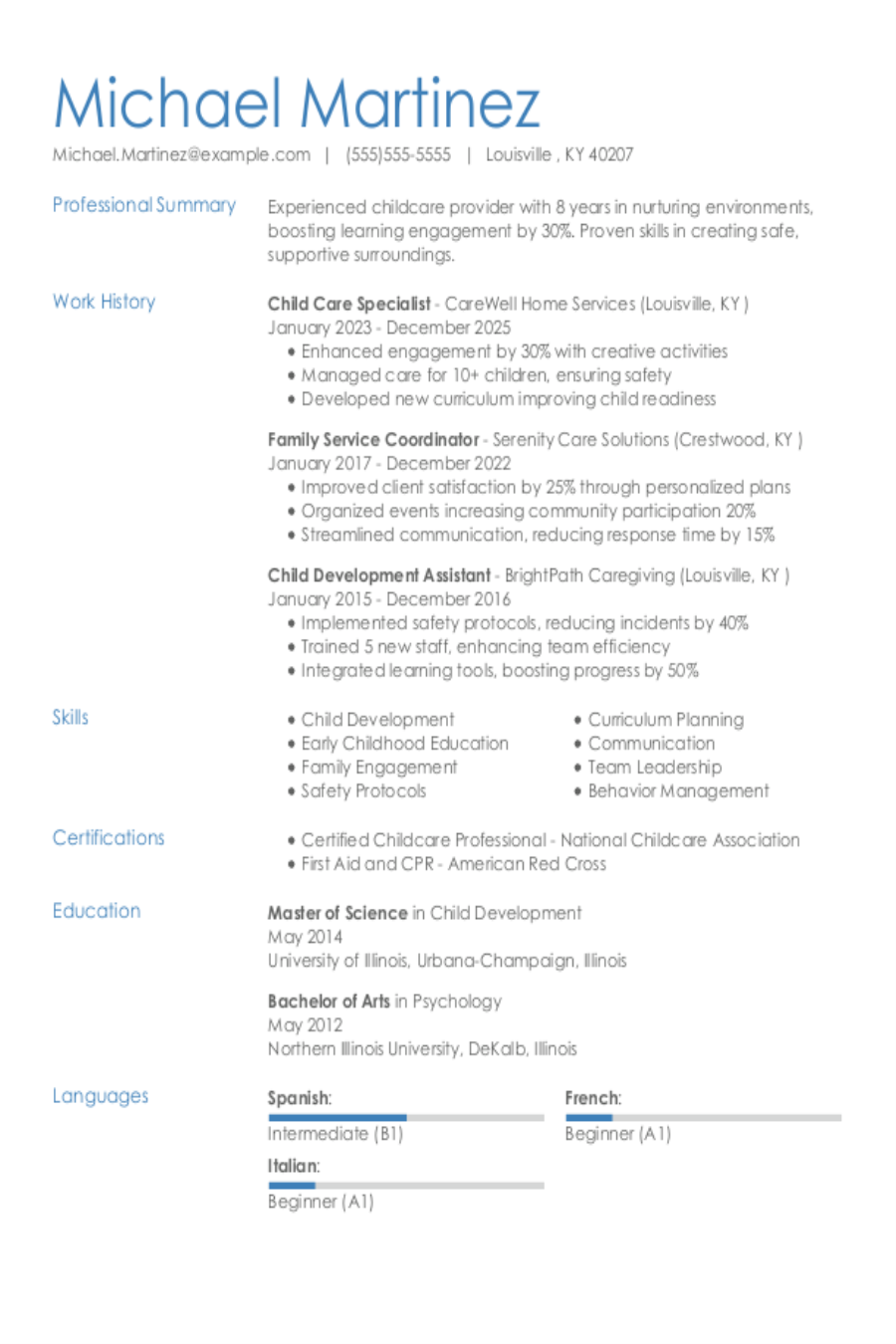A resume’s job is to show employers that you’re the right person for the job. To stand out, you need a resume that conveys your experience and shows employers that you’ve mastered the hard skills they’re looking for.
The right hard skills show employers that you’re prepared to achieve results in their organization. But which hard skills should you choose?
Our comprehensive guide will show you:
- The difference between hard and soft skills
- Examples of hard skills to put on your resume
- Tips for adding hard skills to your resume
- How to improve your hard skills
Ready to make a resume that showcases your expertise? Try our AI Resume Builder. When you add your work history, you’ll get thousands of job-specific skill suggestions to add to your professional summary, work experience, and skills section.

What Are Hard Skills?
Hard skills are job-specific knowledge or abilities acquired through work experience, education, or on-the-job training. Employers prize hard skills because they take time and effort to teach. Hiring someone who already knows how to do something is easier than getting them up to speed.
They’re just as important as soft skills. After all, hard skills provide the technical foundation necessary to perform job-specific tasks, while soft skills enhance how those tasks are executed and how one interacts with colleagues.
Let’s take a moment to explain that difference in more detail.
What’s the difference between hard skills and soft skills?
Most jobs require a mix of hard skills and soft skills. Understanding the difference between the two is essential to presenting a well-rounded skill set to employers.
Here’s how they differ:
- Hard skills are abilities and knowledge, usually tied to a specific industry or job, that enable you to get the job done. They’re learned through school, experience, or training and may be backed up by certifications, degrees, or diplomas.
- Soft skills are the qualities and personality traits you possess naturally or through years of interpersonal experience that help you excel at your job.
Still not 100% sure you see the difference? Here’s a chart to help:
- Patient care
- Software programming
- Interviewing
- Social media
- Project management
- Video production
- Bookkeeping
- Machine operation
- Empathy
- Adaptability
- Conscientiousness
- Communication
- Organization
- Creativity
- Attention to detail
- Work ethic
Notice how the hard skills are specific to certain jobs and would require training and support?
Ultimately, both skill sets are essential to advancing your career, whether you work in a highly technical or service-oriented field.
Now let’s review some examples.
Best Hard Skills to List on a Resume (70+ Examples)
There are many different kinds of hard skills. To help you make sense of the best hard skills for your resume, we’ve broken them down into categories. While the list is not exhaustive, we’re confident you’ll find more than a few professional skills relevant to your job.
If you need more inspiration, check out our resume examples library, which lists actual resumes categorized by job title.
Analytical skills
In the modern workplace, analytical skills are foundational. Whether you’re analyzing the latest consumer data or trying to navigate office politics in a digital space, these skills help you make informed decisions and solve complex problems. Here are a handful of examples:
- Statistical analysis
- Forecasting
- Data interpretation
- Data presentation
- Database management
- Diagnostics
- Resource management
Computer skills
In today’s digital age, computer skills are essential for almost every job. They encompass a range of abilities that enable you to perform certain tasks much more effectively. Here are some key computer skills you might want to include on your resume:
- Microsoft Office (Word, PowerPoint, etc.)
- Email management
- Scheduling software like Google Calendar
- Programming languages like JavaScript and Python
- Pivot tables
- Data entry
- VPN
- Words per minute (WPM)
- Productivity software like Asana and Monday
Construction skills
Construction skills build and maintain the infrastructure around us. These skills combine physical capabilities with technical know-how to ensure projects are completed safely and efficiently. Here are some key hard skills in this category:
- Physical strength
- Dexterity
- Endurance
- Drywall installation
- Roofing
- Forklifts
- Robotics
- HVAC
- Quality control
Design skills
Design skills are key for creating visually appealing and effective communications. Whether you’re working on print or digital projects, these skills help you to convey messages in a visually engaging manner. Here are some examples of important design skills:
- Typography
- Adobe Creative Suite (Indesign, Illustrator, etc.)
- Print design
- Color theory
- Photo composition
- Branding
- User experience (UX) design
- User interface (UI) design
- Illustration
Language skills
When adding language proficiency to your resume, consider this: language skills are the only hard skill that allows you to communicate across different cultures and expand your professional opportunities around the world. Here are language-related hard skills you can add to your resume:
- Speaking in a foreign language, such as Spanish, Mandarin Chinese, German, French, or Arabic
- Writing in a foreign language
- Translating languages
Pro tip:
Choose the scale you’d like to use for your language skills, such as the Common European Framework of Reference (CEFR) or Interagency Language Roundtable (ILR) scale, to clearly indicate your proficiency level.
Management skills
Even if you aren’t a manager, the skill set associated with the role can come in handy. From project coordination to team leadership, management skills are the hard skills that keep the workplace running. Here are a few to add to your resume:
- Budgeting
- Business acumen
- Hiring
- Strategic planning
- Logistics
- Performance tracking
- Employee evaluation
- Business development
Marketing skills
While there are many soft skills in marketing, the hard, technical skills are just as important. The marketing skills below can give you an advantage over other applicants:
- SEO/SEM
- Email automation
- A/B testing
- B2B marketing
- HTML and CSS
- Social media
- Funnel management
- Google Analytics
- Content management systems (CMS)
Medical skills
If you work in medicine, you have undoubtedly developed a range of specialized abilities that are essential for patient care, including critical nursing skills that ensure the well-being and recovery of patients. Here are a handful to consider:
- CPR and first aid
- Medical billing
- Electronic health records (EHR)
- Prescriptions
- Vital signs
- Nutrition
- HIPAA knowledge
Project management skills
Project management skills enable you to oversee projects from inception to completion, ensuring they meet goals, deadlines, and budgets. These skills are highly valued in many industries and involve both strategic planning and day-to-day management. Here are some to highlight on your resume:
- Scrum management
- Kanban
- Agile development
- Risk analysis
- Project scheduling
- Financial modeling
- Prioritization
- Delegating
Writing skills
In today’s fast-paced digital world, writing skills are more important than ever. With the rise of AI and automated content creation tools, the ability to craft clear and engaging content that doesn’t sound too robotic is a valuable asset. Here are some writing skills to highlight on your resume:
- Copywriting
- Technical writing
- Grant writing
- Journalism
- Press releases
- Copy editing (grammar, spelling, punctuation)
How to List Hard Skills on a Resume
Once you’ve chosen the best hard skills for your resume, how do you place them for maximum impact? We’ll walk you through it.
Choose hard skills that match the role you’re targeting
Every job listing includes a wishlist of hard and soft skills that the employer hopes to find in an ideal candidate. You’ll commonly find skills peppered throughout the job ad with section headers like “job description,” “responsibilities,” and “qualifications.”
Comb the listing for opportunities to make sure your resume lines up with what the employer wants. Highlight keywords from the job listing and make them a priority as you fill out your resume sections. Adding these to your application will help you make an ATS-friendly resume.
Take a look at this listing for a computer programmer role. We’ve pulled a couple of bullets from each section, bolding the hard skills that are resume-worthy:
Qualifications
- In-depth knowledge of Python, data structures, and algorithms.
- Extensive experience using CI/CD, Docker, GIT, and SQL.
- Strong understanding of web architecture.
Responsibilities
- Help design, code, and test new APIs using cloud technologies and clean coding practices.
- Audit services to identify and fix any technical issues.
- Collaborate closely with the team on product features and requirements.
When you sit down to write your resume, use the skills from the job listing as a guidebook and checklist of hard skills to put on your resume.
Wondering which hard skills stand out the most on your resume? Try our free ATS Resume Checker. This tool gives your resume an ATS score based on formatting, strategy, and keywords, helping you target the right hard skills for the job.
Showcase your proficiency level
You can add a skill to your resume even if you aren’t an expert in that particular skill set. For example, let’s say you have extensive experience writing budgets, some experience tracking performance, and minor experience overseeing the hiring process.
Here’s how you might showcase your varied experience levels in a resume skills section:
- Expert: Budgeting, forecasting, data analysis, task delegation, Microsoft Office
- Proficient: Performance tracking, employee evaluations, logistics, networking, productivity tools (Monday, Asana)
- Novice: Hiring, onboarding, strategic planning, public speaking, business development, negotiations
There are other ways to specify experience levels. You could add visual flair with color-coding or use special graphics/design features. Only attempt the latter if you’re a skilled designer or have a resume template to help you.
Include hard skills in your experience section
Hard skills aren’t limited to your skills section. They should be sprinkled throughout your resume.
Let’s review an example of a candidate’s job history that includes plenty of hard skills. This is a nursing assistant resume, and the skills are in bold:
Nursing Assistant, General Hospital
Hoboken, NJ, 08/2015–current
- Manage supplies and restock inventory to promote optimal availability for patient care.
- Add and maintain information in electronic health records (EHR), communicating status updates to an interdisciplinary care team.
- Safeguard patient privacy with strict adherence to HIPAA protocols.
Notice how the candidate above includes at least one skill in every work experience bullet point. Additionally, they use action words like manage, maintain, and safeguard to make their work history more energetic and action-oriented.
Highlight hard skills in every resume section
Once you’ve written your work history, it’s time to make sure that the rest of your resume is full of relevant hard skills—from your professional summary to optional sections that some resume formats include, like projects or accomplishments.
What would this look like? Here’s an example professional summary for a restaurant manager with hard skills in bold:
Professional Summary
Hardworking restaurant manager well-versed in schedule management and daily cash deposits for a high-volume, $500K restaurant. Generates new business through creative use of SEO and social media. Diligent and fully invested in providing steadfast leadership in high-pressure situations and excellent customer service.
The key is to ensure every resume section focuses on showing the employer how you’re prepared to contribute to their team. No section should skip the opportunity to keep essential skills in the spotlight.
4 Ways to Improve Your Hard Skills
Improving your hard skills requires time, energy, and resources. Fortunately, it’s easier than ever to find free help developing your skill set. You just need to know where to look.
1. Take free online courses
You don’t have to enroll in a costly degree program to develop new hard skills. Online education is more readily available than ever before. Try a free training course, enroll in a trusted certification program, or attend an online webinar to strengthen your hard skills.
2. Watch YouTube and other tutorial videos
YouTube remains one of the great resources for free learning. The best advice is simply to search for what you’d like to learn. YouTube courses don’t give you a certification to list on your resume, but they do give you a self-paced, open-ended way to try out a new skill or hone an existing ability.
3. Consider in-person classes
Some subjects lend themselves better to in-person learning. Search for programs near you or enroll in community college courses. A bonus of in-person education is that you get to work on your networking skills at the same time!
4. Practice using your hard skills
Ultimately, your hard skills must be put into practice. However, job seekers trying to acquire a new skill that isn’t already part of their day-to-day duties and responsibilities will have to think outside the box. You should try the following strategies:
- Ask your manager whether there are opportunities to build your desired skills.
- Make something with your desired skills on your own time. For example, creating a simple web application with JavaScript.
- Volunteer your time to help with a project that utilizes your desired skills.
Final Thoughts
Hard skills are critical to creating a resume that showcases your expertise. To impress employers, pass through ATS, and land the interview, your resume needs to show that you:
- Understand your industry and know what’s expected for your role.
- Have used relevant hard skills to achieve results in the past.
- Are active in maintaining your skills, developing as a professional, and moving your career forward.
If you’re still not sure what hard skills to use on your resume, try our AI Resume Skills Generator. This free tool uses your job title to generate a list of relevant skills that you can copy, paste, and use throughout your resume.
Hard Skills FAQ
Last Updated: November 25, 2025
There’s no such thing as a “basic” hard skill. Every hard skill exists on a spectrum, depending on the candidate’s experience. For example, someone can be an expert in HTML and CSS but a novice (or basic) in cloud computing.
That said, some hard skills are more common than others. Here are hard skills that are always in high demand:
- Graphic design
- Data analysis
- Adobe Creative Suite (Photoshop, Illustrator, InDesign)
- Programming languages (Python, JavaScript, PHP)
- Patient care
- Foreign languages
- Copywriting
- Computer software knowledge
- Project management
The top five hard skills employers are looking for this year include:
- Digital literacy: In 2025, nearly all well-paying jobs required a high degree of tech literacy.
- Project management: Understanding Agile development, scrums, and productivity tools is a significant advantage in the job market.
- Coding/programming: Computer programmers remain in high demand in most industries.
- Data management: The ongoing data deluge shows no signs of slowing, creating an even greater need for data expertise.
- Customer service: Companies need happy, paying customers to thrive, so they’re always looking for customer service experts.
Writing your cover letter is an excellent opportunity to emphasize your hard skills. We suggest writing a concise, powerful anecdote about how you used your hard skills to deliver results for the company.
Alternatively, lay out your most critical skills and how they help meet company goals. Here’s a paragraph from a cover letter written for a customer service job that executes that strategy perfectly:
“For the past four years, I've worked as a customer service representative at Burlington, being accountable for quality assurance, inbound call handling, and data management. I've been the escalation point for service issues that require elevated decision-making to maintain both the company brand and customer happiness. I also manage to consistently meet or exceed service benchmarks.”
Need help getting your cover letter started? Try our AI Cover Letter Generator to create a letter that makes your hard skills shine.
Was this information about Hard Skills: 70+ Examples To Put On Your Resume helpful? Let us know!
Don is a Certified Professional Resume Writer (CPRW) with more than 10 years’ experience creating digital content, including four years helping job seekers develop their careers. He holds an M.S. in Journalism from Northwestern University.
More resources

AI-Resistant Careers Index 2026: 20 Jobs That AI Can’t Replace
Resume Now s latest report breaks down the most AI-proof caree...

60% of U.S. Workers Expect AI to Eliminate More Jobs Than It Creates in 2026
Resume Now s newest report shows growing concerns about the im...

Best Resume Font for 2026 (+ Size and Formatting Tips)
Find the best resume font for your resume with our comprehensi...

Child Care Resume: Examples & Templates
As a child care professional you need a resume that showcases...

Entertainment Resume: Examples & Templates
As an entertainment professional you need a resume that captu...

Culinary Resume: Examples & Templates
As a culinary professional you need a resume that highlights ...
